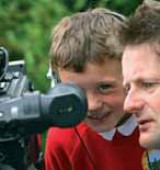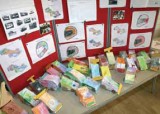A VIP experience at Silverstone was the motivation for pupils at St Matthias C of E Primary School during their F3 racing project
Taking inspiration from her husband’s role as a motorsports cameraman, Emma Rowe contacted the Stephane Ratel Organisation (SRO) with what at first must have seemed like an outlandish request: “I’d like to bring a Formula 3 car into our school…” Half expecting an incredulous silence, Emma was surprised to find her gumption rewarded. As she laid out her detailed plans for a design and technology project that artfully linked classroom learning to its relevance in the real world, the SRO acquiesced and the wheels were set in motion for 12 lucky pupils to receive VIP treatment at the Silverstone Grand Prix Circuit in October.
One of the driving forces behind Emma’s project was a desire for the school to not overlook handson learning in favour of purely academic approaches. She explained that after being placed under special measures, the school - St Matthias C of E Primary in Malvern - focused a lot of energy on improving the literacy and numeracy abilities of its pupils at the possible detriment of practical skills. “There has been a real push on the academic side of things to get children to read and write and maybe we’ve forgotten that practical skills are reallyimportant too. I truly believe that children need the opportunity to partake in real life experiences, be aware of the science and technology behind them and realise that they have the skills and knowledge to access them.”
However, Emma went on to explain how even practical projects like this can highlight the importance of literacy and numeracy skills. “I want children to enjoy learning and to be engaged and for them to realise that you do need to know how to read and write for a reason. I think that if you don’t show them what the reason is and give thema purpose for what they’re learning then they’re not going to learn and they’re not going to be empowered by it.”
 The project began with a whole-school assembly where the pupils were shown a specially made short film featuring Formula 3 drivers challenging the children to design and build a simple vehicle which would then be raced a week later in the presence of Russell Eacot, Team Boss of British Formula 3 team TSport, and Formula 3 driver Menasheh Idafar. The children were also informed that Russell and Menasheh would be selecting 12 pupils’ work on the basis of their ability to stick to the design brief, their commitment and enthusiasm to the project and, of course, the speed of their car - with the lucky few receiving a VIP trackside experience at October’s F3 event at Silverstone.
The project began with a whole-school assembly where the pupils were shown a specially made short film featuring Formula 3 drivers challenging the children to design and build a simple vehicle which would then be raced a week later in the presence of Russell Eacot, Team Boss of British Formula 3 team TSport, and Formula 3 driver Menasheh Idafar. The children were also informed that Russell and Menasheh would be selecting 12 pupils’ work on the basis of their ability to stick to the design brief, their commitment and enthusiasm to the project and, of course, the speed of their car - with the lucky few receiving a VIP trackside experience at October’s F3 event at Silverstone.
In the week following the announcement of the project, the pupils at St Matthias not only spent classroom time working on their vehicles, they also dedicated their own time at home to the research, design and construction process. This desire to work on the project away from school and also the interest shown by parents was one of the positive aspects of the whole experience for Emma as she explained that engaging parents had proven a difficult task in the past.
 After all the preparation by the pupils, teachers and everyone else involved in the project, the day of the event was preceded with a sense of anticipation for all concerned and, as Emma explained, the Formula 3 representatives did not disappoint. “When the team came in they were absolutely brilliant; they let the children look round the truck, they let them get in the car, they talked about the tyres and asked questions about friction that related to tyre choice. They were making links to all the things the pupils had done in the classroom and making it real.”
After all the preparation by the pupils, teachers and everyone else involved in the project, the day of the event was preceded with a sense of anticipation for all concerned and, as Emma explained, the Formula 3 representatives did not disappoint. “When the team came in they were absolutely brilliant; they let the children look round the truck, they let them get in the car, they talked about the tyres and asked questions about friction that related to tyre choice. They were making links to all the things the pupils had done in the classroom and making it real.”
This ability to draw upon what the children had learnt in class and continuously refer back to it had been one of the project’s main objectives from the outset, and it has helped the pupils to see the tangible benefits of their classroom based education. “They learnt that the things we do in school are transferable skills and we were quite explicit as teachers in showing them that what they’d been taught in the classroom had a reason and this was an example of that.”
Not only focusing on the science and design behind motion and vehicles, the project also challenged the children’s oral and written skills as they had to present their vehicle to the T-Sport team and explain the specifics behind the design. In Emma’s opinion, this ability to engage and challenge pupils on so many levels is what made the project a success. And despite the hard work and personal time she and the other staff put into the organisation, she finished telling us that she had been humbled by the children’s enthusiasm and that the event had inspired some pupils to seek a possible career in engineering.
 With British drivers competing at the highest level in the world of motorsport and Formula 1 remaining free-to-air via the BBC, the popularity and scope of motorsport continues to grow. The scientific and technological relevance of the sport also ensures it has pertinent links to education and learning opportunities for primary school pupils throughout the UK. Here are just two of the current initiatives that your school can get involved with:
With British drivers competing at the highest level in the world of motorsport and Formula 1 remaining free-to-air via the BBC, the popularity and scope of motorsport continues to grow. The scientific and technological relevance of the sport also ensures it has pertinent links to education and learning opportunities for primary school pupils throughout the UK. Here are just two of the current initiatives that your school can get involved with:
Race to learn (racetolearn.org)
In association with Williams F1, the Race to Learn initiative is a cross-curricular teaching resource that inducts children into the world of Formula 1 and looks at every aspect of the industry from the science behind the cars to the business behind the sponsorship. Linked to relevant National Curriculum objectives, the children benefit from a real life learning experience that engages what they learn in class. Teachers needn’t worry about a lack of prior knowledge as resources and teacher’s notes ensures anyone undertaking the scheme is au fait before starting.
F1 in schools (f1inschools.co.uk)
Running both primary and secondary school schemes, the F1 in Schools programme challenges students to design, manufacture and race miniature F1 cars. Also looking closely at the commercial, financial and creative side of the sport, students are required to go beyond the scientific demands of the project and utilise many cross-curricular disciplines. The real life learning experience teaches pupils the importance of teamwork and leadership within the sport whilst also highlighting the tangible benefits of their education and giving them the opportunity to compete against other schools.
Use scaffolding to wean children off high levels of TA support
Ace-Kitchen-Manager
